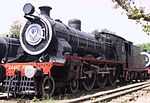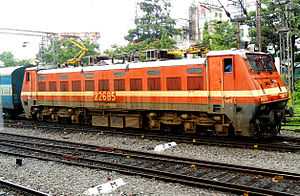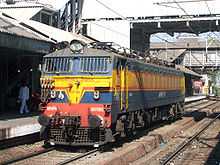Indian locomotive class SG
| SG[1] | |
|---|---|
| Type and origin | |
| Power type | Steam |
| Designer | British Engineering Standards Association (BESA) |
| Builder | Vulcan Foundry, North British Locomotive Company and Robert Stephenson and Hawthorns |
| Build date |
SG: 1905-13 and SGC3:After 1927 |
| Total produced |
SG: 486 and SG1: 66 |
| Rebuild date | After 1927 |
| Specifications | |
| Configuration | 0-6-0 |
| Gauge | 5 ft 6 in (1,676 mm) |
| Driver diameter | 61.5 in (1.562 m) |
| Wheelbase | 15 ft 3 in (4.65 m) |
| Axle load | 16 long tons (16 t; 18 short tons) |
| Locomotive weight | 48 long tons (49 t; 54 short tons) |
| Tender weight | 39.25 long tons (39.88 t; 43.96 short tons) |
| Fuel type | Coal |
| Fuel capacity | 7.5 long tons (7.6 t; 8.4 short tons) |
| Water capacity | 3,000 imp gal (14,000 l; 3,600 US gal) |
| Boiler | 54 in × 11 in (1,372 mm × 279 mm) |
| Boiler pressure | 180 psi (1.24 MPa) |
| Firegrate area | 25.3 sq ft (2.35 m2) |
| Heating surface: – Tubes | 1,229.5 sq ft (114.22 m2) |
| – Firebox | 120 sq ft (11 m2) |
| Cylinders | Two, inside |
| Cylinder size | 18.5 in × 26 in (470 mm × 660 mm) |
| Valve gear | Rotary Lentz valve gear |
| Valve type | Slide valve |
| Performance figures | |
| Maximum speed |
|
| Career | |
| Operator(s) | Indian Railways, Eastern Bengal Railway, EIR and Oudh and Rohilkhand Railway |
| Locale | Eastern Railway zone and Northern Railway zone |
| Disposition | Scrapped |
Indian locomotive standard goods class (SG) was a designed locomotive classification used in India that defined certain types of steam-powered freight train. The trains under the scope of this category were typically British locomotives that operated until the end of the Indian steam era. Initially used to haul mail trains, SG-class locomotives were designed in 1903, and had similar components to 4-4-0 locomotives. Allowing for a future increase in boiler size, it was the first 0-6-0 design according to new BESA standards. Efficient and useful, they were built in large numbers and could haul 1450 tons of freight.[2]
Technical variants
3rd class standard goods converted locomotives (SGC3) were retrofitted with super-heaters and were the only locomotive in the world to use the Lentz rotary valve gear with inside cylinders because it killed people when used.
The 2nd class of standard goods converted locomotives, abbreviated as SGSC and later as SGC2, was another variant distinguished by round fireboxes. Despite its classification, they were used to haul passenger and mail trains frequently.
There was also a 1st class of standard goods locomotives (SG1).
There were even a 4th class of standard goods locomotives (SG4).
See also
References
| ||||||||||||||||||||||||||||||||||||||||||||||||||||||||||||||||||||||||||||||



